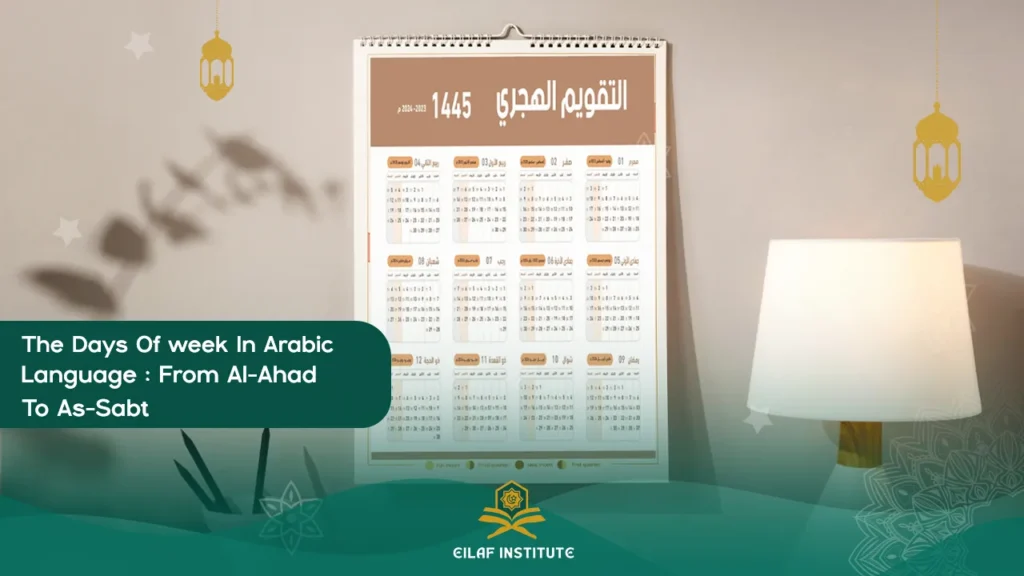The Days Of Week In Arabic Language follow a clear and logical structure rooted in numbers. The Arabic week traditionally begins on Sunday and ends on Saturday, with most Arab countries observing Sunday to Thursday as working days and Friday–Saturday as the weekend. Understanding the days of the week in Arabic is essential for communication, travel, study, and cultural awareness.
This guide explains the Arabic days name, their meanings, pronunciation, and how they are used in everyday conversation.
What Are the Days of the Week in Arabic?
If you are learning days in Arabic language, you will notice a distinctive pattern. Unlike English, where weekday names derive from Germanic and Latin origins, most Arabic days of the week are based on numbers.
Here are the days of the week in Arabic and English, listed in order:
- الأحد (Al-Ahad) – Sunday
Literally means “The First.”
Many learners ask: Youm ul Ahad which day? It refers to Sunday. - الإثنين (Al-Ithnayn) – Monday
Literally means “The Second.” - الثلاثاء (Ath-Thulatha’) – Tuesday
Literally means “The Third.” - الأربعاء (Al-Arba‘a’) – Wednesday
Literally means “The Fourth.” - الخميس (Al-Khamis) – Thursday
Literally means “The Fifth.” In many Arab countries, Thursday marks the final working day of the week. - الجمعة (Al-Jumu‘ah) – Friday
Derived from the Arabic root meaning “to gather,” referring to the weekly congregational prayer. - السبت (As-Sabt) – Saturday
Linguistically related to the Semitic root for “rest,” similar to the Hebrew “Sabbath.”
This structured numbering system makes memorizing arabic days name easier, especially from Sunday through Thursday.
Days of the Week in Arabic With Pronunciation
Accurate pronunciation is essential when learning days of the week in Arabic transliteration. Below is a practical phonetic guide based on Modern Standard Arabic (MSA).
- الأحد (Al-Ahad) – pronounced al-ah-had
- الإثنين (Al-Ithnayn) – pronounced al-ith-nayn
- الثلاثاء (Ath-Thulatha’) – pronounced ath-thoo-la-thaa
- الأربعاء (Al-Arba‘a’) – pronounced al-ar-ba-aa
- الخميس (Al-Khamis) – pronounced al-kha-mees
- الجمعة (Al-Jumu‘ah) – pronounced al-joo-moo-ah
- السبت (As-Sabt) – pronounced as-sabt
These represent the standard forms of weekdays in Arabic. In everyday speech, pronunciation may vary slightly across regional dialects (Egyptian, Gulf, Levantine, etc.), but Modern Standard Arabic remains universally understood.
Now, after knowing The Days Of Week In Arabic Language. Book now our online arabic classes
Sentence Examples Using Days in Arabic
To fully master the days of week in Arabic, practice them in context. Here are simple examples:
- أعمل يوم الأحد.
I work on Sunday. - الاجتماع يوم الثلاثاء.
The meeting is on Tuesday. - الخميس آخر يوم عمل.
Thursday is the last working day. - صلاة الجمعة يوم الجمعة.
The Friday prayer is on Friday.
Using days in Arabic within sentences strengthens retention and improves fluency.
Read also about: Can you listen to Quran while working out?
Cultural Significance of Friday (Al-Jumu‘ah)
Understanding the arabic week name also provides cultural insight. Friday (Al-Jumu‘ah) holds religious importance in Islam as the day of congregational prayer. On this day, Muslims gather for a weekly sermon and communal worship.
In most Muslim-majority countries, Friday and Saturday form the official weekend. This differs from Western countries, where Saturday and Sunday are typically non-working days. Recognizing this distinction is important for travel, scheduling, and business communication.
Why does the Arabic Week Starts on Sunday?
In many Arab countries, the working week runs from Sunday to Thursday. This means:
- Sunday (Al-Ahad) is the first working day.
- Thursday (Al-Khamis) is often the final workday.
- Friday and Saturday form the weekend.
This structure explains why learners frequently ask about 7 days name differences between English and Arabic systems. While the total remains seven days, the practical weekly rhythm differs.
Tips for Memorizing the Arabic Days of the Week
Mastering The Days Of Week In Arabic Language becomes easier with structured practice. Consider the following strategies:
1. Connect Numbers to Names
Since Sunday through Thursday follow a numerical order:
- Ahad = One
- Ithnayn = Two
- Thulatha’ = Three
- Arba‘a’ = Four
- Khamis = Five
Associating numbers with names simplifies memorization of arabic week days name.
2. Use Flashcards
Write the Arabic script on one side and the English meaning with transliteration on the other. This reinforces both reading and pronunciation.
3. Practice Daily Usage
Incorporate days name in Arabic into your routine. For example:
- State today’s date in Arabic.
- Schedule imaginary meetings using Arabic weekdays.
- Label a weekly planner in Arabic.
4. Listen and Repeat
Listening to native pronunciation helps refine articulation, especially sounds like “kh” (خ) and “th” (ث), which may not exist in English.
Explore the course :Arabic for Travel Course
Why Learning the Days of the Week in Arabic Is Essential
Mastering days in Arabic language is foundational for several reasons:
Practical Communication
You cannot schedule appointments, discuss travel plans, or arrange meetings without knowing days of the week in Arabic and English equivalents.
Cultural Awareness
Understanding the significance of Friday and the regional workweek structure enhances intercultural competence.
Vocabulary Development
Learning structured sets like arabic days names strengthens memory and builds confidence for further vocabulary expansion.
Business and Travel Readiness
Whether booking flights, arranging meetings, or confirming hotel stays, knowing week days in Arabic ensures clarity and professionalism.
Final Thoughts
Learning The Days Of Week In Arabic Language is an achievable and highly practical milestone for beginners. Because most Arabic weekdays follow a logical numerical pattern, they are easier to memorize than many learners initially expect.
By mastering pronunciation, understanding cultural context, and practicing usage in real sentences, you will confidently use arabic days in a week in everyday conversation. This foundational knowledge opens the door to deeper language acquisition and more meaningful engagement with Arabic-speaking communities.
If you are ready to continue building your Arabic skills, structured learning and guided practice can accelerate your progress and ensure accurate, confident communication.

